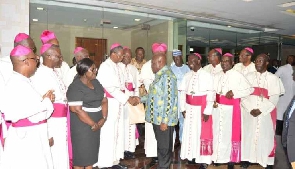The Catholic Bishops Conference has advised politicians to desist from influencing the decision of electorates with money during elections and for the electorates to also stop taking money in exchange of votes.
According to the Bishops “buying and selling votes corrupts the nobility of politics and distorts people power and will”.
In a pastoral letter titled: “Politics for nation-building and social cohesion in Ghana”, the Bishops said when the electoral processes are monetised then “politicians are elected not for their good leadership qualities, their high moral and ethical values, as well as the noble vocation to serve the common good and the country, but for ‘mammon’.”
It is recalled that in the recently ended New Patriotic Party (NPP) parliamentary primaries, there was series of allegations of vote buying with some candidates confessing to it.
The losing aspirant in the NPP’s Tema East race, Mr Benjamin Ashitey Armah, for example said while he gave each of the 767 delegates that voted in the internal polls GH¢550, his main contender, the incumbent MP, Mr Daniel Titus-Glover, gave each delegate a tabletop fridge and GH¢1,000.
Mr Ashitey Armah told Kwame Appiah-Kubi on CTV’s Dwabre Mu morning show on Monday, 22 June 2020 that: “I use the little resources I have to do my politics”, adding: “I was able to give each delegate GH¢550”.
“He [Titus-Glover] gave each delegate a tabletop fridge, GH¢1000 and even went the extra mile to give some delegates in my stronghold an extra GH¢500”, he alleged.
Dr Dickson Adomako Kissi, the victor in the Anyaa Sowutuom parliamentary race also revealed on the same platform that he spent more than GH¢1 million in cash on his delegates.
The main opposition National Democratic Congress (NDC) has also been accused of vote-buying in previous elections.
The Bishops have, therefore, counselled Ghanaians to eschew such “political and electoral corruption”.
General News of Wednesday, 12 August 2020
Source: classfmonline.com













